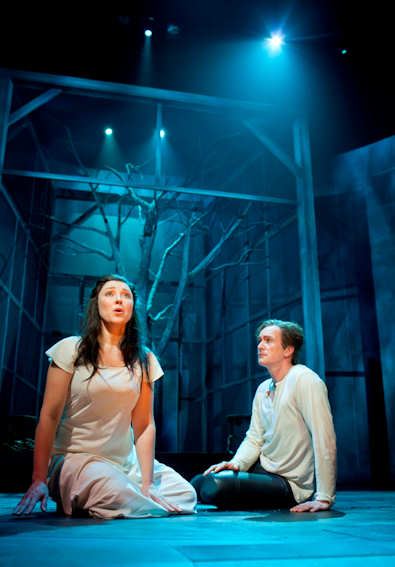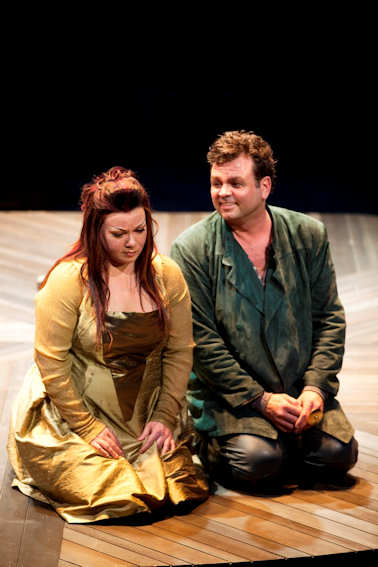Wagner, Der Ring des Nibelungen : Soloists, Wermland Opera Orchestra and Chorus, Henrik Schaefer (conductor), Karlstad Theatre , Sweden , June – July 2011 (NS)
Gods:
Wotan/Wanderer – Fredrik Zetterström ( Rheingold , Siegfried ), Urban Malmberg ( Die Walküre )
Fricka – Ivonne Fuchs
Freia – Anne Bolstad
Loge – Rickard Söderberg
Froh – Kaj Hagstrand
Donner – Anders Larsson
Erda – Maria Streijffert
Nibelung Dwarfs:
Alberich – Marcus Jupither
Mime – Jonas Durán
Giants:
Fasolt – Andreas Franzén
Fafner – Johan Schinkler
Rhinemaidens:
Woglinde – Natalie Hernborg
Wellgunde – Anneli Lindfors
Flosshilde – Jeanette Goldstein
Valkyries:
Brünnhilde – AnnLouice Lögdlund
Helmwige – Natalie Hernborg
Ortlinde – Maria Metzler Sædén
Gerhilde – Anne Bolstad
Waltraute – Astrid Robillard (Martina Dike in Götterdämmerung)
Siegrune – Sara P Eriksson
Rossweisse – Jeanette Goldstein
Grimgerde – Ivonne Fuchs
Schwertleite – Maria Streijffert
Norns:
First Norn: Maria Streijffert
Second Norn: Astrid Robillard
Third Norn: Maria Metzler Sædén
Humans:
Siegmund – Jan Kyhle
Sieglinde – Susanna Levonen
Hunding – Michael Schmidberger
Siegfried – Pär Lindskog
Gunther – Anders Larsson
Gutrune – Anne Bolstad
Hagen – Johan Schinkler
Forest bird – Natalie Hernborg
Värmland Opera Chorus and children
Production team:
Conductor – Henrik Schaefer
Director – Wilhelm Carlsson
Sets – Peter Lundquist
Costumes – Ann-Mari Anttila
Lighting – Torkel Blomkvist
Masks and wigs – Ulrika Nilsson
Chorusmaster – Martin Andersson

For a small Swedish opera company to perform the whole of Wagner’s Ring Cycle five times might sound like the kind of hubris that got Wotan into so much trouble. In fact, the Wermland Opera’s production succeeded beyond my expectations. Not only was the musical standard excellent, but the production was also able to turn the restrictions of the tiny Karlstad Theatre (all of 330 seats in this production) into positive strengths.
Because of the tiny pit, the orchestra had been relocated to the Upper Circle for this production. In addition, the conductor chose a performance style similar to the practice in Wagner’s lifetime by having the string section play with gut strings and employ portamento. The whole effect was like surround sound in a cinema, and I never felt that the orchestra was underpowered despite being far smaller than specified in the score. Henrik Schaefer’s conducting was inspired, ensuring that the sense of line and musical flow through the operas never flagged.
The orchestra’s position and the small scale of the theatre made each opera a very intimate experience. The direction avoided grand concepts, instead bringing to vivid life the relationships between the characters and the timeless nature of the story. The costumes were imaginative but tasteful, helping the characterisation but never dehumanising the dwarves and the giants. The sets centred on a tilting turntable that aided scene changes and acted as a focal point for the characters on stage. The turntable was also used to particularly good effect in combination with a “Rhine” made from green lasers. The effect in the beginning of Rheingold when first a hand, then feet, then the Rhinemaidens’ heads appeared from under this surface was magical.
The Wermland Opera managed to assemble a strong cast of soloists, most of them from Sweden. Fredrik Zetterström is an experienced baritone and was an excellent choice to sing Wotan: he sang well (even when he had come down with a bad cold on the morning of Siegfried) and acted very convincingly. Urban Malmberg, Wotan in Die Walküre, also acted well (in particular in his duets with Brünnhilde) but his voice was not up to the standard set by Mr Zetterström.
Jan Kyhle, an experienced Siegmund, gave a tremendous performance both vocally and dramatically with his warm Wagnerian tenor. In his hands Siegmund’s emotional journey from being an outcast to finding love and then looking Death (in the form of Brünnhilde) in the eye was extremely moving. The crucial chemistry between him and Susanna Levonen (in her debut as Sieglinde) was there from the start. Ms Levonen’s interpretation of her role was sensitive and her beautifully clear singing never flagged, not even in her soaring part in Act III of Walküre.
The other central couple of the Ring was less well-matched. Pär Lindskog was in his element as a stroppy teenager in Siegfried, but his sensitive acting also allowed Siegfried to display other sides of his character, such as his regrets after the killing of Fafner and his discovery of love. His confrontation with Brünnhilde in Götterdämmerung was absolutely gripping. His bright, brassy timbre was appropriate for the role, but he had a tendency to hit his notes too low and slide up to the centre of the note.

AnnLouice Lögdlund, in her debut as Brünnhilde, had no such technical blemishes. She was, in a word, terrific. From her very first entrance she showed a deep understanding of her character and acted very convincingly. Her voice was radiant and warm, without exaggerated vibrato. Although a true Wagnerian voice with a glorious fortissimo, she was also able to float pianissimo phrases even at the upper end of her register. Despite a punishing performance schedule she almost never flagged. The world’s great opera companies don’t know what they’re missing.
There were also very strong performances from Marcus Jupither (Alberich), Jonas Durán (Mime) and Johan Schinkler (Fafner and Hagen). With his shaven head, tattoo and barbaric black leather garments Alberich had a dominant stage presence and exuded malevolence. Mr Durán’s Mime was outstanding, a perceptive characterisation reminiscent of Gollum in Tolkien’s Lord of the Rings and with beautiful and wonderfully expressive singing. Mr Schinkler performed both of his parts very well, with an excellent bass. His acting as Hagen was particularly strong; we could clearly see how Hagen’s personality was twisted by the hatred passed down to him by Alberich.
It is always a pleasure to see an operatic production that has no weak links to disturb the experience. But Wermland Opera’s Ring Cycle was an even more impressive achievement: a Ring that equalled the efforts of the world’s great opera companies. It was a world-class Gesamtkunstwerk.
Niklas Smith
Pictures © Mats Bäcker
Niklas Smith’s interest in classical music began when he attended the Salzburg Easter Festival in utero and greatly enjoyed Herbert von Karajan’s conducting. He grew up in England and while at school and studying History and Economics at Cambridge performed in student choirs and orchestras. He now lives in Gothenburg, Sweden and is a regular member of the audience at the local Opera and Symphony Orchestra
Note: This is Niklas Smith’s summary of the cycle. His individual reviews of each opera (including links to biographies of the main soloists) are available here: Das Rheingold, Die Walküre, Siegfried and Götterdämmerung
Göran Forsling previously reviewed Wermland (formerly Värmland) Opera’s productions of La bohème and Rigoletto for Seen and Heard (Eds)